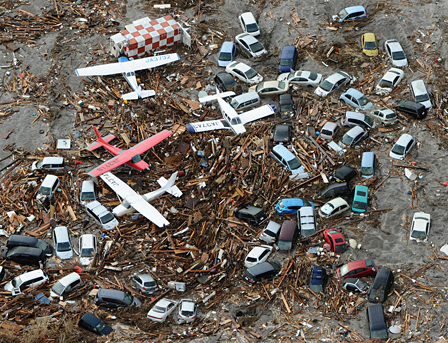Erstellt am: 11. 3. 2011 - 17:11 Uhr
Japan's Earthquake
Friday 11th March 06:27: The Associated Press news agency sends out a report about the Japanese Prime Minister Naoto Kan saying he won't resign after acknowledging that his office had unknowingly received illegal donations from a foreign supporter.
Less than half an hour later, the Japanese Prime Minister is faced with a problem of a completely different magnitude.
At 06:54 Associated Press sends out a single line:
"Strong earthquake strikes northern Japan, = rattling buildings in Tokyo; tsunami warning issued"
That was how Japan's worst earthquake on record was first communicated to newsrooms around the world.
Measuring 8.9 it was one of the largest earthquakes ever recorded. It triggered a ferocious tsunami several metres high that swept away boats, cars and entire buildings. The apocalyptic images of surging water broadcast by Japanese TV networks resembled scenes from a Hollywood disaster movie.

EPA
News agency reports of deaths started early this morning with one, by 10 o'clock it was 5, then it started rising rapidly – 17, 29, 32, 40, 60, and by the afternoon it was in the hundreds. Entire trains and boats have been swept away, and it will be some time before the scale of the tragedy will be known.
The government says there has been enormous damage, but at this stage it's still hard to assess the full extent. There are also alarming reports of a state of emergency at one of Japan's 54 nuclear power stations. Some 3,000 residents living near a plant in Fukushima prefecture, north of Tokyo, have been told to evacuate the area. It's the first time Japan has declared a state of emergency at a nuclear power plant.
The news agency stories continue to come in quick and fast. So also have a look at the latest developements on ORF.at.
Hear more on the aftermath of the Japanese earthquake on this Saturday's Reality Check Special (12-13).
Dieses Element ist nicht mehr verfügbar
Or subscribe to the Reality Check podcast and get the whole programme after the show!


